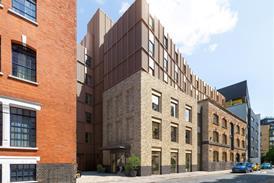- Home
 Heatherwick unveils designs for first residential project in South Korea
Heatherwick unveils designs for first residential project in South Korea Architecture practices monitoring Middle East teams as Iran conflict escalates
Architecture practices monitoring Middle East teams as Iran conflict escalates Green light for Ackroyd Lowrie’s co-living redesign of SPPARC office scheme in Bermondsey
Green light for Ackroyd Lowrie’s co-living redesign of SPPARC office scheme in Bermondsey Reuse of historic buildings dominates 2026 RIAS Awards shortlist
Reuse of historic buildings dominates 2026 RIAS Awards shortlist
- Intelligence for Architects
- Subscribe
- Jobs
- Events

Events calendar Explore now 
Keep up to date
Find out more
- Programmes
- CPD
- More from navigation items
Oki uses first engagement as RIBA president to highlight reuse agenda and architects' role in left behind communities

New president wants architects to lead the way on reuse and find new purpose in a socially responsible mission
Muyiwa Oki made a clear statement of intent this week, by ensuring that one of his first engagements as RIBA president was chairing a townhall meeting entitled “Re-fit for Purpose” in the Lancashire coastal town of Fleetwood.
The event, held on Wednesday in the town’s former hospital, was a collaboration between the RIBA and The Prince’s Foundation. The meeting was intended to put a spotlight on the reuse agenda and its potential to drive grassroots regeneration. In Fleetwood, this agenda is centred on the re-purposing of the town’s former hospital as a new community hub, to include a café and further education classes, alongside other services.
…
This content is available to registered users | Already registered?Login here
You are not currently logged in.
To continue reading this story, sign up for free guest access
Existing Subscriber? LOGIN
REGISTER for free access on selected stories and sign up for email alerts. You get:
- Up to the minute architecture news from around the UK
- Breaking, daily and weekly e-newsletters
Subscribe to Building Design and you will benefit from:

- Unlimited news
- Reviews of the latest buildings from all corners of the world
- Technical studies
- Full access to all our online archives
- PLUS you will receive a digital copy of WA100 worth over £45
Subscribe now for unlimited access.


